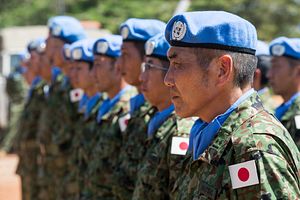On Sunday, Japanese Prime Minister Shinzo Abe reviewed Ground Self-Defense Forces (GSDF) at the training area in Asaka, Saitama. At the parade, Abe told troops to be prepared to perform new tasks, specifically tasks that require the use of force beyond the minimum for self-defense, which are now legal under security laws enacted last year. He reiterated, “The new tasks will be aimed at protecting our precious peace and passing it to the next generation. I want you to firmly keep this in your mind.”
These new tasks could be assigned as soon as mid-November to Japanese GSDF troops being dispatched to South Sudan for a five-month extension to Japanese involvement in the UN peacekeeping operation. The next batch of GSDF troops are primarily being sent to support infrastructure building, though they have also been trained to perform these new missions. They will replace a 350-member currently unit in the country that focuses on engineering.
However, the situation has become more complicated since major fighting broke out in the South Sudanese capital of Juba last July. As the situation grows increasingly unstable in this young country, the decision hinges on whether the Abe government decides South Sudan’s ceasefire is holding or not. If the ceasefire is deemed to exist, then the new legal framework for the use of force in the name of collective self-defense holds. This is most likely the tack that the Abe government will try to pursue, as they have repeatedly argued that the rebel forces cannot be considered a party to the conflict because they do not represent a country or quasi-country. The Abe government has also argued that the situation remains relatively stable around Juba.
But if the Abe government deems that South Sudan is in a state of war, the Japanese Constitution’s war-renouncing Article 9 will take precedence, as the SDF prohibition on the use of force to resolve international conflicts still holds. However, contingencies such as coming to the aid of other nations’ peacekeeping troops and civilians under fire orjointly guarding base camps with UN peacekeeping troops open the possibility for the use of force beyond self-defense.
Legal concerns will continue to hound any sort of changes to SDF missions. According to The Yomiuri Shimbun, the Ministry of Defense (MOD) plans to use helmet cameras during these expanded missions. The recorded footage can be used to make a determination at a later time as to whether an SDF member properly followed protocol in the use of their weapon or not. If Japan decides to assign new missions to GSDF troops in South Sudan, MOD plans to provide them with small wearable cameras.
As Japanese culture and public consciousness has yet to catch up with the legal changes, such scrutiny is necessary to assure the populace that the new laws are being followed to the tee, but may also pose a danger if SDF troops get too caught up mulling over the legal consequences of their actions when they really need to be focused on protecting themselves and those that depend on their protection.
The government is also trying to be as transparent within what they deem to be reasonably possible – partially opening a GSDF training exercise in Morioka, Iwate to media observation on Monday. Though media could not view training involving weapons use, media did observe scenarios such as GSDF troops aiding UN staff inside a building surrounded by rioters or joining troops of another country to defend a UN peacekeeping camp from rioters. Critics of the partial nature of the media observation argue that the government did not want the public to have images of GSDF troops pointing weapons at rioters.
SDF training for these new missions began in August.
While Abe has been adamant about making Japan a country that can make a “proactive contribution to peace,” his message can be undercut by the hesitation exhibited by other agents of the Japanese state. For example, a high-ranking GSDF officer told The Asahi Shimbun, “If something like the July incident occurs, the members will evacuate to their base camp. In situations when the opposing force has an overwhelming advantage, we would not be able to undertake kaketsuke-keigo (literally translates as “rushing in [from elsewhere] to help”) even if asked to do so by the UN. We will not rush into a situation whenever we are called.”
It makes good political sense to not put troops in danger when they do not need to be in danger, and it is morally obvious that the use of violence should be minimized as much as possible. However, the answer to a more dangerous world is not defeatism. The Japanese government is rightly investing more in capacity and training so that Japan can back up its words with action, while also striving to manage expectations from allies such as the U.S.
Relatedly, Japanese government sources told The Asahi Shimbun that Japan will lease additional land from the Djibouti government next year. The additional land will expand Japan’s military base in this eastern African locale, and Japanese officials hope this move will increase Japan’s influence in the strategically located country – where China is currently building what will become its first overseas military facility. The purpose of the existing 12-hectare site is for the SDF to operate anti-piracy missions in the Gulf of Aden and off the coast of Somalia as part of an international effort. The justification to increase its base is to have an aircraft ready there to evacuate Japanese citizens from the continent who might get caught up in trouble or natural disasters.
Three C-130 aircraft were sent to Djibouti last month in case Japanese citizens would need to be evacuated from Juba. This, only the second ever mission undertaken by SDF transport aircraft, is a significant step to expand Japan’s overseas presence, and proves the SDF’s fledgling ability to conduct operations abroad.

































